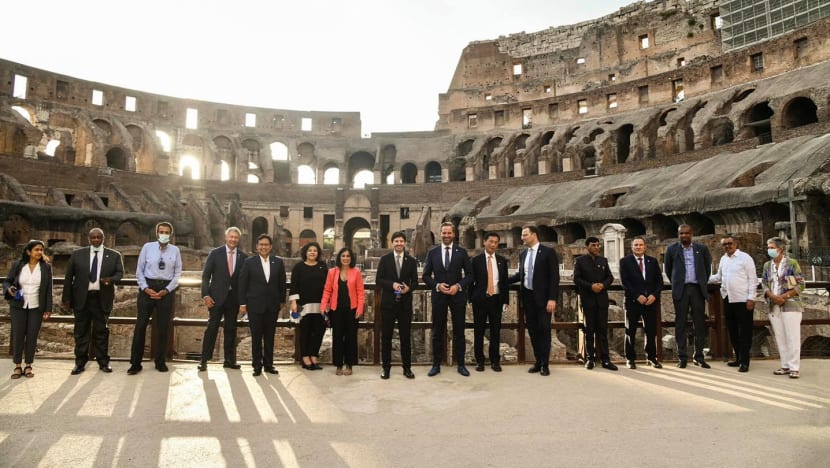G20 health ministers aim to vaccinate 40% of global population against COVID-19 by end-2021

The G20 Health Ministers’ Meeting (HMM) was held in Rome, Italy from Sep 5 to Sep 6, 2021. (Photo: Facebook/Ong Ye Kung)
SINGAPORE: Health Minister Ong Ye Kung and his counterparts from the Group of Twenty (G20) are aiming to vaccinate at least 40 per cent of the world against COVID-19 by the end of the year.
The target was announced at the G20 Health Ministers’ Meeting, held from Sunday (Sep 5) to Monday in Rome.
In a press release on Monday, Singapore's Ministry of Health (MOH) said the meeting had also adopted a Health Ministers’ Declaration emphasising the importance of strong multilateral collaboration in managing the COVID-19 pandemic and supporting global recovery, with the World Health Organization (WHO) taking a central and leading role. The health ministers also agreed that vaccination was key.
The declaration recognised the wide-ranging impact of COVID-19, including on mental health and on progress in achieving the UN Sustainable Development Goals, which address global challenges including poverty, inequality, climate change, environmental degradation, peace and justice.
The declaration also underscored the need to continue joint efforts to better prevent, detect and respond to future global health risks and emergencies, said MOH.
Singapore attended the meeting as a guest country at the invitation of Italy, the current G20 presidency.
"There is a palpable sense of resilience amongst all the health ministers," said Mr Ong in a Facebook post on Monday.
"This is one of those rare international meetings where a united purpose is forged by a common challenge."
In his three interventions made during the meeting, Mr Ong spoke about Singapore’s COVID-19 experience as a city-state, emphasising the importance of strengthening health emergency preparedness in an urban setting.
He also called on countries to keep global supply chains open, and to avoid a situation where different parts of the world recognise different vaccines, which will divide the global people’s network.
STRONG PRIMARY CARE SYSTEM NEEDED
In his first intervention, Mr Ong highlighted the different experiences of countries dealing with the pandemic, in particular Singapore's challenges.
Mr Ong detailed Singapore's vaccination take-up rates, noting that the country's main challenge was "persuading the people who needed vaccines the most to get vaccinated", namely the seniors.
The vaccination rate for seniors above 70 in the country now stand at 88 per cent, when it used to be between 60 and 70 per cent.
"And therein we realised our weakness," said Mr Ong.
"Our weakness was our primary care system. To get the most vulnerable members of our society to get vaccinated, you need a strong primary care system to persuade them. So when we think about other countries, the problem will be multi-fold."
Mr Ong said that a strong international system is thus needed to build up the healthcare response for the next pandemic, and urgently get going the reforms recommended by the G20 High Level Independent Panel to strengthen multilateralism in healthcare.
This would in turn strengthen the support for WHO to play its key role at the centre of global health security.
In his second intervention, Mr Ong noted that COVID-19 infections occur disproportionately in cities due to population densities and interaction, and that Singapore would be including urban health preparedness in future runs of the country's capacity-building programmes for developing countries.
He said that he hopes this would be useful in helping others future-proof their urban environments against future crises.
Mr Ong's third intervention contained two points. First, equitable access to disease control tools - vaccines, therapeutics and diagnostics (VTDs) - has to be ensured through working global supply chains, with key nodes of global distribution needing to stay open.
He said that he hoped all countries would refrain "to the maximum extent" the imposition of export controls of essential medical items and vaccines.
The second point Mr Ong mentioned was to guard against the disruption of people to people connections around the world, as it would "undo decades of progress to build collaboration and mutual dependence between countries and regions for a safer and more prosperous world".
"So as global travel resumes, having a passport is no longer sufficient to travel and enter a country, one may also require to have the right vaccine," he said.
"We hope that G20 can take the lead to ensure that the world will not disintegrate into regions which cannot recognise each other’s vaccines."
BOOKMARK THIS: Our comprehensive coverage of the COVID-19 pandemic and its developments
Download our app or subscribe to our Telegram channel for the latest updates on the coronavirus pandemic: https://cna.asia/telegram
















